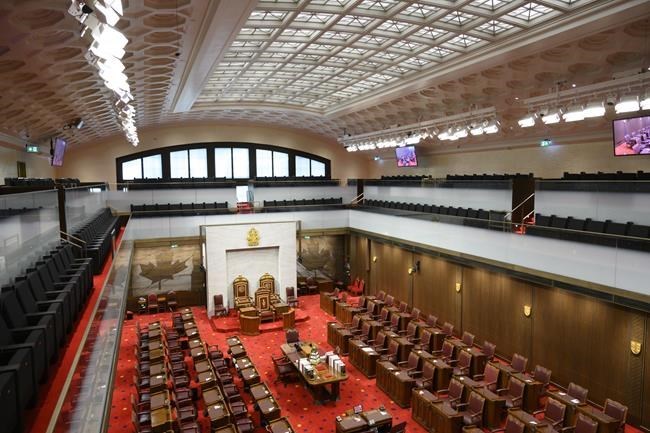OTTAWA — Forced and coerced sterilization should be a criminal offence and those subjected to it deserve an apology and compensation, a Senate committee said in a report Thursday.
The Senate human rights committee has been studying the issue since 2019, and concluded in a final report that forced and coerced sterilizations persist in Canada and both legal and policy responses are needed.
The senators say the "horrific practice" disproportionately affects vulnerable and marginalized groups including Indigenous women, Black and racialized women and people with disabilities.
The report defines forced or coerced sterilization as a surgical procedure to prevent conception that is performed without a patient's free, prior and informed consent.
“The repercussions of forced and coerced sterilization are extensive, lasting and devastating," Sen. Yvonne Boyer told a news conference Thursday.
Boyer said survivors who spoke to the committee delivered "powerful truths" and that survivors must guide the way forward.
“The survivors who testified were unequivocal: they believe that racism was the driving force behind their unwanted sterilizations,” Boyer said.
“On top of the trauma of undergoing the procedure itself, witnesses describe long-term health and psychological effects, including depression, anxiety and loss of trust in the medical system.”
The report noted that Canada has a long history of forced and coerced sterilization through laws and government policies that sought to reduce births in Indigenous and Black communities, as well as people living in poverty or with disabilities.
Boyer said the finding that struck her the most was the deep-rooted impact of sterilization on entire communities and future generations.
“Forced sterilization disrupts and breaks the natural laws that Indigenous Peoples have followed since time immemorial,” she said.
Boyer said more detailed data documenting the prevalence of the practice is forthcoming based on reports from survivors. One estimate suggests as many as one-quarter of the women in Igloolik, Nun. may have been forceably sterilized.
A proposed class-action lawsuit led by lawyer Alisa Lombard is also underway to seek compensation for Saskatchewan and Manitoba women who say they forced or coerced sterilization, some as recently as 2018. More than 100 women have joined that lawsuit thus far.
Other proposed class actions are underway in Alberta and Quebec, as well as an individual action case filed last year in Northwest Territories.
The United Nations Committee Against Torture called on Canada in 2020 to stop the "extensive forced or coerced sterilization" of Indigenous women and girls in the country.
Boyer already introduced a bill in the Senate last month that would make it a criminal offence to sterilize someone against their will or without their consent. She is urging the government to pass the bill quickly.
While existing Criminal Code offences criminalizing assault could be used to prosecute forced sterilizations, Sen. Salma Ataullahjan said the committee has not seen consequences for anyone engaging in the practice.
In the report, Lombard said there is no sign of doctors facing consequences for acts of forced or coerced sterilization which could change if a specific criminal offence is created.
"If doctors know that they could potentially be subject to criminal sanctions, this could change behaviour quite quickly," said Lombard.
Sen. Michèle Audette added that it would help women or families to know there is legislation specifically designed to protect them.
Crown-Indigenous Relations Minister Marc Miller said in an interview Thursday that the government is "absolutely willing" to talk to the senators and "perhaps" look at what changes need to be made to the Criminal Code.
He said it would be an oversimplification to say that non-consensual sterilizations already are a crime because "the ways in which forced sterilization occurs is much more subtle, much more insidious, and the legacy of systemic racism in the health care system."
Boyer read a statement from a First Nations woman in southern Alberta who said she was coerced into being sterilized after having four children. She said her mother was also sterilized shortly after having her.
“I've been attacked by a system that wished harm on the continuance of my family and ancestral lineage,” she said in the statement.
“It's simply genocide, limiting the number of my immediate family unit, my relatives, members of my tribe, and Indigenous existence.”
NDP Crown-Indigenous relations critic Lori Idlout said forced sterilization is "state violence against Indigenous women" whose voices were ignored for too many years as they reported what happened to them.
She said it is "incomprehensible" that laws in existence already aren't being enforced.
"The RCMP, police forces, and medical associations should be investigating all allegations of forced or coerced legislation and responding appropriately," said Idlout. "The continued ignorance of these complaints must cease immediately."
Idlout said any restorative justice measures, including compensation, "must be led by the Inuit, First Nations and Métis survivors, families, and communities affected by forced and coerced sterilization."
"Justice can only come after truth," said Idlout. "All levels of government have a role in addressing the forced sterilization of women and girls, and recognition of those harms must come from all levels of government."
This report by The Canadian Press was first published July 14, 2022.
---
This story was produced with the financial assistance of the Meta and Canadian Press News Fellowship.
Erika Ibrahim, The Canadian Press




